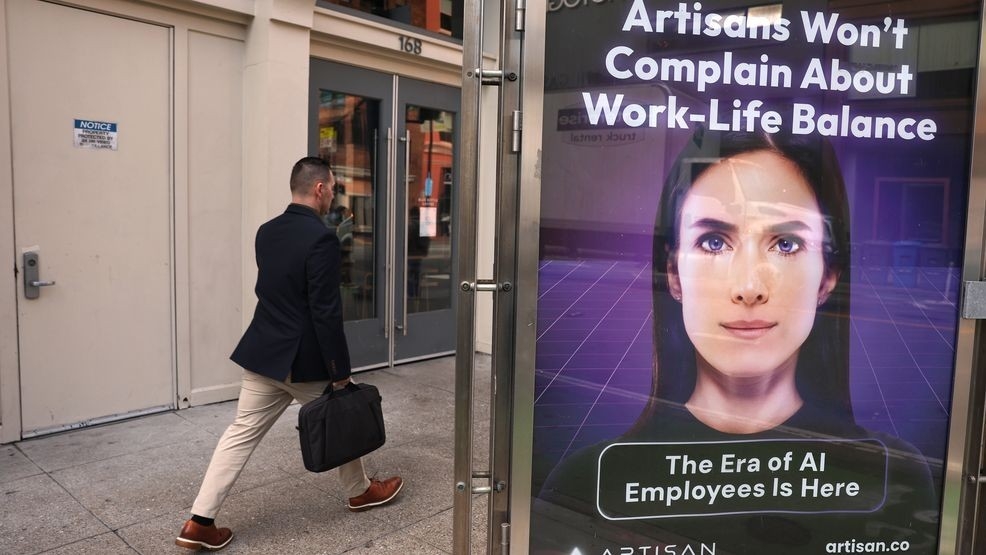Description
(TNND) — New analysis from Goldman Sachs economists estimated that artificial intelligence might not lead to widespread job losses some fear.
The researchers developed a baseline assumption that 6% or 7% of the U.S. workforce could be displaced if AI is widely adopted, though they said displacement rates could vary from 3% to 14% under different assumptions.
And they expect the job disruptions that do occur to be temporary, with new opportunities created by the technology.
“A recent pickup in AI adoption and reports of AI-related layoffs have raised concerns that AI will lead to widespread labor displacement,” Joseph Briggs, who co-leads the Global Economics team in Goldman Sachs Research, and economist Sarah Dong, wrote in a report. “While these trends could broaden as adoption increases, we remain skeptical that AI will lead to large employment reductions over the next decade.”
They believe that generative AI could increase productivity by around 15% when fully adopted, and that could translate into a half-percentage-point rise in the unemployment rate above its trend during a period of transition.
Mark Muro, a senior fellow at Brookings Metro who researches AI and the digital economy, said the Goldman Sachs estimates are “at the low end of the spectrum of a body of research that is taking this issue very seriously.”
But he, too, isn’t taking a doom-and-gloom view of AI’s impact on jobs.
“I would agree with non-dystopian near-to-medium-term job disruptions such as this team proposes,” Muro said Thursday. “And we calculated last year that only about 30% of all workers would see half of their jobs disrupted.”
SEE ALSO: Mapping AI's embrace: Which American cities are making their mark?
A Pew Research Center report earlier this year found that just over half of workers are worried about AI in the workplace.
And around a third of workers expect AI will reduce job opportunities.
A recent Gallup report found that AI use at work has roughly doubled in the last couple of years. But regular AI usage at work is still fairly low.
Just 19% used AI at least a few times a week, and just 8% used it daily.
But Gallup also found that most people expect AI to have a big societal impact, even more than the computer, internet or telephones.
“AI is going to be a disruptive tool,” Molly Kinder, a fellow at Brookings Metro and an expert on how innovations can impact the labor market, told The National News Desk last year. “It's both going to be a tool that improves work for many people, but there's also a lot of risk of disruptions that will leave workers either with skills that are no longer relevant (or) potentially even in jobs that have now become obsolete."
Anton Dahbura, an AI expert and the co-director of the Johns Hopkins Institute for Assured Autonomy, also told TNND last year that people have been afraid of technological advancements displacing them “since the dawn of the Industrial Age,” if not earlier.
“We still need humans very much,” Dahbura said. “We just need them in different ways, and so people that recognize that and are forward-looking, they'll continue to thrive.”
The Goldman Sachs analysis, published Wednesday, said that AI adoption remains low even though it has accelerated among larger companies.
They looked at hundreds of jobs to determine how AI could impact them and found that those at highest risk of displacement included computer programmers, accountants and auditors, legal and administrative assistants, customer service representatives, telemarketers, proofreaders and copy editors, and credit analysts.
Those at the lowest risk included air traffic controllers, chief executives, radiologists, pharmacists, residential advisors, photographers, and members of the clergy.
The Goldman Sachs researchers noted that technological advancements might lead to disruptions, but they also generate new opportunities.
About 60% of Americans work in jobs that didn’t exist in 1940, they said.
Muro said slower AI adoption is an important factor that could give the labor market more time to adjust.
“I don't think that we're talking in the near-term about massive job loss,” he said.
But AI is a serious issue for workers, he said.
Don’t ignore AI.
Don’t underestimate it.
“Workers should be very much be making sure that they are staying current with the technology, seeing if it can help them in their work tasks,” Muro said. “And they should not view the new research as some get-out-of-jail-free card. I think these are substantial challenges to workers over the next decade.”
Muro said AI’s full impact on jobs might not become clear until we go through a recession.
That might speed up AI adoption. And when the economy recovers, that’s when we’ll see how much companies choose to rely on AI over people.
Other Related News
08/14/2025
DAMASCUS Ga WALB - On Thursday morning members of the Survival Flight Team honored a man w...
08/14/2025
WALB is working to produce a video for this story In the meantime we encourage you to watc...
08/14/2025
CRISP COUNTY Ga WALB - The Crisp County Sheriffs Office CCSO responded to complaints of dr...
08/14/2025
TALLAHASSEE Fla WCTV - On Monday the National Hurricane Center designated Tropical Storm E...
08/14/2025








